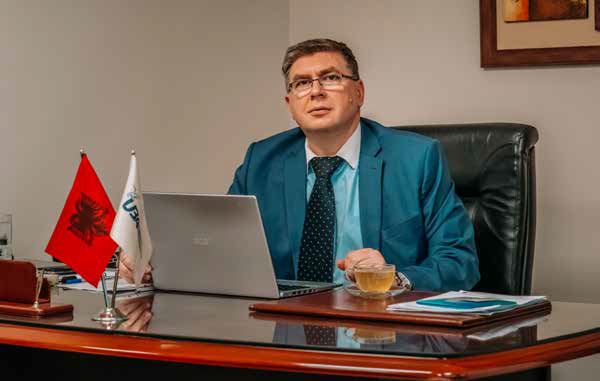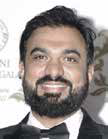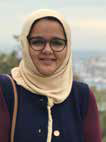AMEL KOVACEVIC – Chief Executive Officer, United Bank of Albania
We have reinstated Personality Interviews in our magazine, with the intend of introducing our readers with the Islamic banking and finance professionals that they know or have heard of, and would like to know more about them on a personal level. Our first personality for this new version of interviews, is the Chief Executive Officer of the United Bank of Albania, with over 20 years of experience in finance, banking and diplomacy.
AS A CEO, WHAT ARE THE THREE CONCERNS ABOUT THE BANK’S FUTURE THAT KEEPS YOU UP AT NIGHT?
Accepting the responsibility of being a CEO in the times of a global pandemic that we have found ourselves in 2020 raises a number of concerns but also opportunities. The number one concern for me right now is if we will be fast enough to digitalise the banking processes and interactions with our clients before the corona chaos ends. Here lies a great opportunity for the United Bank of Albania to surpass competitors and provide better customer service. This brings us to the second concern, which is catering to the needs for our clients in this challenging period. Lastly, how can Islamic financial institutions such as the United Bank of Albania contribute to benefit the local communities.
HOW DO YOU THINK WILL THE LIAISON WITH THE ISLAMIC DEVELOPMENT BANK BENEFIT THE UNITED BANK OF ALBANIA AND THE REPUBLIC OF ALBANIA AS A WHOLE?
The Islamic Development Bank is a multi-governmental developmental institution that promotes social and economic development in Muslim communities worldwide by building partnerships between governments and the private sector while adding value through shared knowhow. The United Bank of Albania serves as a bridge between the Islamic Development Bank and the Republic of Albania, which identifies the developmental and welfare needs of Albania as well as to propose projects and execute them while channelling IsDB funds to Albania. For the UBA itself to have a major shareholder such as the Islamic Development Bank brings stability and networking access.
There are in total 41 projects founded by the IsDB, 15 of these are active and 26 have been completed with a total cost of USD 606.4 million. In addition of this, due to the Albanian Earthquake in 2019, the commitment of the Islamic Development Bank is up to 415 million euros; 365 million euros in investments in financing loans for feasible projects and programmes in sectors such as health, education, social housing, infrastructure, etc. over the next 5 years, and furthermore 50 million euros in business recovery loans. In total the financial loans to Albania since 1995 is USD1.0214 million.
WHAT ARE THE FAILURES IN YOUR CAREER THAT YOU CHERISH THE MOST?
The most defining period of my life was when I had to leave my home as a young man due to ethnic cleansing. Attending university across the globe in these circumstances shaped the man I am today and has taught me invaluable lessons. Starting from scratch and building my career in the post-war Bosnia taught me patience and that everything comes to its place when you fight for the good cause.
HOW DO YOU DEAL WITH DIFFERENT PERSONALITIES IN THE WORKPLACE?
Diversity is very important in any workplace because it gives us an opportunity to see things from a broader perspective and have a greater chance of fruitful results. On the other hand, it is an important task to handle the differences and communicate constructively. In order to lead people, one needs to understand them and for understanding, active listening and open communication is a must.

THE READERS WOULD LIKE TO KNOW ABOUT SOMETHING YOU STRUGGLED WITH EARLY ON IN YOUR CAREER AND HOW YOU OVERCAME IT.
I had finished my master’s degree at the International Islamic University Malaysia in 1998, when I decided to come back to Bosnia and Herzegovina and be the youth force willing to rebuild the economy. Starting out in a post-war era with limited resources, dire straits, survival instincts and determination are the preconditions for a successful career. Spending time and working for organisations that are focused on teaching new skills and sharing knowledge unselfishly is a way to go. Hustling after knowledge rather than money is very important when starting out.
IF YOU HAD MULTIPLE PROJECTS AND LIMITED TIME, HOW WOULD YOU MANAGE YOUR PRIORITIES?
Firstly, I classify these projects according to various criteria such as results that will be achieved if implemented, time and resources needed to accomplish it, the strategic importance of the project to stakeholders and level of complexity. Usually, I use a weighted average than I rank them accordingly.
DESCRIBE A TIME WHEN YOU WERE NOT PLEASED WITH YOUR WORK AND WHY?
Human Resource Management statistics found out that autonomy at workplaces is one of the top things that determine job satisfaction. I am no exception when it comes to job satisfaction, I believe that autonomy at work is quite essential for stimulating creativity and achieving better results. Whenever the environment at work is not welcoming to new ideas and or comprehending different visions my job satisfaction would be demotivating.
WHAT PERSONAL OR PROFESSIONAL ACCOMPLISHMENTS ARE YOU MOST PROUD OF?
Personally, I am proud of my family. The worldview and moral values that my kids grew up with and adhere to makes me proud. Professionally, I am always thrilled with new challenges. As time passes by, they become more and more complex, and important to societies I work in. However, the best feeling is when you see that your efforts have made a sustainable and long-term impact on your customers and beneficiaries.
HOW DO YOU DEFINE SUCCESS?
Ultimate success is with God Almighty. It is a waste of time and resources in anyone’s life if end result is not satisfactory from an eternal point of view. However, success to me is reflected in the fruits of endeavour. If the result is a long-lasting and perpetual improvement of the situation than we can count it as a success. Perceived success reflected in the short-run presentation without a solid base can deceive someone for some time but will eventually fail, creating more harm to the stakeholders.
TELL US ABOUT A CHALLENGE YOU FACED AND HOW YOU HANDLED IT.
One of my characteristics is the ability to comprehend very complex situations with grave importance for the organisation that I belong to. Analysing all aspects of the situation helps me to prepare creative cost-effective technologically-powered solutions. The postmodern times in which we live and work are so complex, chaotic, interconnected and with unmeasurable impact on so many lives across the world. Our job is not to fight it but rather to navigate through it.

WHO IS YOUR ROLE MODEL AND WHY?
Role models in the postmodern times are not required. Rather we should be able to identify ourselves with principles and moral values. Being a Muslim, the source of my inspiration is Prophet Muhammad (SAWS). As an economist and banker, I strongly believe in inclusiveness, meritocracy and social justice.

TELL US ABOUT A PROJECT OR AN ACCOMPLISHMENT THAT YOU CONSIDER TO BE THE MOST SIGNIFICANT IN YOUR CAREER.
As an ambassador of Bosnia and Hercegovina to the People’s Republic of China, I was very proud to put Bosnia on the Chinese investment map. As an Islamic banker, I was honoured with the award of the best Islamic retail bank in Europe.
WHAT KIND OF WORK WOULD MAKE YOU EXCITED TO GET OUT OF BED ON MONDAY MORNING?
Having a positive and long-lasting impact on society is very important for me and I try to do that through my work. Being an active and productive member of the society excites me every morning out of bed.
IF YOU COULD GO BACK FIVE YEARS, WHAT ADVICE WOULD YOU GIVE YOUR YOUNGER SELF?
Study more. Always study more, anytime, any day and anywhere. Knowledge is power and it can never be taken away from you.
TELL US ABOUT A PROJECT OR AN ACCOMPLISHMENT THAT YOU CONSIDER TO BE THE MOST SIGNIFICANT IN YOUR CAREER.
As an ambassador of Bosnia and Hercegovina to the People’s Republic of China, I was very proud to put Bosnia on the Chinese investment map. As an Islamic banker, I was honoured with the award of the best Islamic retail bank in Europe.
WHAT KIND OF WORK WOULD MAKE YOU EXCITED TO GET OUT OF BED ON MONDAY MORNING?
Having a positive and long-lasting impact on society is very important for me and I try to do that through my work. Being an active and productive member of the society excites me every morning out of bed.
IF YOU COULD GO BACK FIVE YEARS, WHAT ADVICE WOULD YOU GIVE YOUR YOUNGER SELF?
Study more. Always study more, anytime, any day and anywhere. Knowledge is power and it can never be taken away from you.
IN THE POST-COVID ERA, TECHNOLOGY IS EXPECTED TOBECENTRALTOALLEDUCATIONAL AND TRAINING ACTIVITIES, AND ISLAMIC FINANCE TRAINING SHOULDN’T BE AN EXCEPTION. IN YOUR VIEW, HOW CAN A GLOBALLY RECOGNISED TECHNOLOGY-DRIVEN ISLAMIC FINANCE QUALIFICATION BE DEVELOPED?
Islamic finance is a growing industry with a global presence that is increasing with time, especially in these uncertain economic times. Like any other industry, Islamic finance also requires standardised education and research, to develop a workforce that can stimulate economic growth parallel to the conventional system. Last year, the number of Islamic finance education providers globally was 968, out of which 371 were degree providers while 445 only provided certain courses. According to Statista 2020, Indonesia had the highest number of Islamic finance education providers, followed by the UK and Malaysia.
However, there is a discrepancy in the specialisations offered and the need of the industry. 90% of the degree programmes offered in the discipline of Islamic finance are focused on Islamic economics, auditing or Islamic law, with little or no focus in areas of Islamic asset management, Islamic alternative investments and Islamic insurance (takaful), and actuarial practices. Even though the scope of Islamic finance is gaining prominence, a downward trend has been spotted as many universities
have removed such degrees and courses due to lack of demand. This is an alarming situation as it reflects non-interest and lack of awareness among the general public, especially the youth who are opting for other disciplines instead.
In the current situation, Islamic finance has become the need of the time, but we still require qualified professionals and skilled human resource to grow the industry to compete with the conventional banking and finance industry. The new age of digitalisation and Fintech is good news for the industry and is already attracting attention from bankers, finance professionals, investors and consumers. Islamic Fintech is a new sun on the horizon that can stimulate growth and create new markets and economy, but we need a new education system for it as well.
The Forbes Magazine stated that “the future of Islamic FinTech is bright”. We asked a number of finance professionals and educators their opinions on developing a digitalised qualification for the Islamic finance industry.

DR EDDY CHONG SIONG CHOY
Chief Technical Officer
Finance Accreditation Agency
In tandem with the rapid growth and changing landscape of the financial services industry (FSI), one needs to be constantly equipped with current knowledge and the competencies required. This means that one must constantly be trained, open to learn new things and be able to bring them back for practice at the workplace.
Capacity building has been a part and parcel of individuals involved in the FSI. Traditionally, many training and development programmes have been offered through conventional, face-to- face means. Although the online mode has been talked about for some time as the ‘new norm’, it has been slow to gain wide recognition, until the COVID-19 pandemic hit us.
The pandemic has provided us with the opportunity to develop technology-driven Islamic finance qualifications. Whilst technology plays an important role, it should be viewed as an enabler to the effective delivery of content in Islamic finance. This requires training providers to think of learning outcomes, curriculum, planning for delivery, materials, the learning experience and assessments, which works cyclically.
There is already an established body of knowledge of professional qualifications in Islamic finance. The Islamic Finance Professional Qualifications Structure (IFPQS) developed by the Finance Accreditation Agency (FAA) can be used to design and develop the e-content of Islamic finance qualifications. The IFPQS, being a globally benchmarked learning structure, was built around the Finance Qualifications Structure, a six-level competency-based qualifications structure, enabling Islamic finance qualifications to be developed at the basic, intermediate or advanced levels with the associated learning outcomes. The IFPQS provides guidance on the minimum
level of knowledge required by any Islamic finance professional, whilst training providers in different jurisdictions can contextualise some of the content to their specific needs. This ensures consistency where the core learning areas are covered, facilitating recognition of these qualifications across borders.
Equally important is its delivery. Delivering an Islamic finance learning programme online requires both asynchronous and synchronous activities. Accordingly, the participants are given reading materials and assignments in advance through the learning management system (asynchronous) before the interactive session takes place (synchronous). This is followed by assessments (such as assignments, projects and tests), done either asynchronously or synchronously. Experts have suggested that both the asynchronous and synchronous activities been given equal emphasis. Acknowledging the importance of such planning, the FAA has developed e-learning guidelines to guide training providers in designing, developing and delivering learning programmes online effectively.
THANKS TO TECHNOLOGY, THERE ARE NOW AN INCREASING NUMBER OF TOOLS AVAILABLE, WHICH COULD BE USED TO DESIGN E-MATERIALS AND FACILITATE ONLINE DELIVERY.
Thanks to technology, there are now an increasing number of tools available, which could be used to design e-materials and facilitate online
delivery, such as Google Jamboard, Twiddla, Loom, YouTube Studio, Perusall, Padlet and even the recording function on Microsoft PowerPoint. There are also tools to design and facilitate online assessments such as Geniusscan and Gradescope, as well as browser lockers such as Respondus and Examity, to name some.
The major challenge, however, lies in the effective delivery of the content online to ensure the desired learning experience, with effective engagement of the learners. This is a very critical aspect that should not be neglected for any Islamic finance programme to achieve the intended learning outcomes. For this, the FAA has recently launched the e-Certified Training Professional programme, which in part aims to enable participants in learning how to engage their learners in online delivery.
Another core feature of IFPQS lies in its flexibility where the structure can be used to develop qualifications, certifications or even short courses. With micro-credentials gaining traction all over the world, thanks to technology, bite-size Islamic finance qualifications can be developed by referring to the IFPQS.
As quality and consistency of these qualifications need to be safeguarded, FAA can support Islamic finance education and training providers to quality-assure these qualifications to ensure alignment of the learning outcomes, teaching and learning, and assessment and competencies. FAA can also serve to connect these providers to enable the competency-based curriculum to be designed and delivered for the general good of the FSI. With technology, the training and development landscape will not be the same again, where exciting experiences await us.

MOHAMMAD SHAHEED KHAN
Chief Executive Officer Pointcentive Ltd
COVID-19 is definitely here to stay and has been one of the biggest accelerators towards digital adoption by both the public & private sectors, and education and training sectors are no exception. The widespread use of digital technology in learning and development is the only way forward.
As an advisor on Islamic banking to the Bahrain Institute of Banking and Finance, the Central Bank of Bahrain’s training arm, I know the phenomenal work that is done to develop e-learning capabilities with their strategy geared towards innovation. They are the oldest Islamic finance professional qualifications provider and have an impressive e-Learning portal offering digital courses like; Intro to Islamic Banking, Islamic Capital Markets, etc.
BIBF has exclusively partnered with AAOIFI to bring all Shari’a Standards onto e-Learning, including animated explanations, self-assessments, case studies, and supplementary reading of fifty-four (54) Shari’a Standards. The Shari’a Standards were launched online in 2017, developed in-house by the Centre’s e-Learning Unit. They have an agreement with the IFSB pertaining to e-Learning. Furthermore, BIBF has launched virtual training that can be delivered live anywhere in the world. In 2018, the Centre launched the first-ever Islamic banking e-simulation training, which gamifies an Islamic bank’s workings on a computer.
The future for Islamic finance training relies on partnerships with Islamic financial institutions and training institutions to bring in applied learning rather than the theoretical aspects. The challenge is to ensure that the content is relevant, and ideally, the trainers be practitioners or ex-industry people.
THE FUTURE FOR ISLAMICFINANCE TRAINING RELIES ON PARTNERSHIPS WITH ISLAMIC FINANCIAL INSTITUTIONS ANDTRAININGINSTITUTIONSTOBRING IN APPLIED LEARNING RATHER THAN THE THEORETICALASPECTS.
The Islamic finance qualification should use skills, knowledge and practical application methodology to map training objectives, first to a blended model (in-class vs. online) and then to the digital learning environment tools. Integrated virtual learning environment’s implementation with tools for social learning tools has allowed for professional development, best practices sharing, and created knowledge communities. Learning is fundamentally a social phenomenon.
To quickly close the skill and knowledge gaps, the platform should use microlearning, brevity, bite-sized modules, short text and phrases, images (illustrations), animations, videos, short snippets of speech, tests and quizzes, and games (e.g., simple single-screen challenges). Microlearning is more engaging, flexible, boosts knowledge retention, is cheaper and faster to produce over regular eLearning, and is less time-consuming. It is beneficial for corporate and commercial training needs, especially for busy professionals who can only study in short stints.
Augmented reality and the use of holograms have many potentials that cannot be ignored. With 3D hologram, one can pinch, zoom and rotate the equipment related to the course. I read about MIT’s shapeshifting display that allows users in one place to interact with 3D versions of objects in a different location. It can render 3D content physically so that users can interact with digital information tangibly. The Islamic finance training providers can also look into the use of such technologies to enhance the learning experience. Overall the Islamic Finance Qualification 2.0 should focus on skilling, upskilling, and reskilling, while the use of cutting-edge technologies should not be ignored.

FAHAD SIDDIQUI
Chief Operating Officer
TAIF Digital Institute for Islamic Finance
Who would have thought that the COVID-19 pandemic would turn out to be a blessing in disguise for the education industry? We knew the Islamic Finance Industry (IFI) was rapidly shifting even before the COVID-19 pandemic. Now, with the world turned on its head, IFI’s must adjust for the workforce of the future. We all are witnessing that job role are changing, and there is now a growing need for upskilling and reskilling technically and socially. Organisations
and academic institutions are forced to rethink ways to operate differently and we see a high demand in the use of digital tools to carry out the work task. With e-Learning on acceleration and digital adaption rate increasing, organisations are turning their attention inward to prepare their workforce for an unpredictable future by introducing technological courses to train and upskill their employees. It is expected that e-Learning will reach up to USD375 billion by 2025 with a 8% CAGR or growth rate. As such, Islamic finance studies should not let go of the opportunity and quickly jump on the bandwagon.
We also see government initiatives to introduce Islamic ‘Digital Economy’ to help accelerate Islamic assets growth. Such Islamic finance qualifications will also help to support these initiatives practically.
Challenges Faced by the Islamic Finance
Industry
Before we dig into the nitty-gritty of why a technologically-driven Islamic finance qualification is necessary, lets recap on the challenges faced by the industry and how tech can help solve them. I had the privilege to led various international operations for one of the largest International Islamic banks in various geographies and the biggest challenge I faced was finding the right talent!
Transformation of the Islamic Finance Education Industry is Required
As per the ICD (Islamic Corporation for the Development of the Private Sector) report, there are a total of 968+ Islamic finance education providers around the world but we see a lack of cooperation between Islamic finance academia and the industry across the globe. Consequently, the growth of Islamic finance professionals and technology adoption in the industry didn’t keep pace, for example, according to AIMs, 80,000 professionals are currently needed in the industry while the number of graduates is only 5,000 per annum, which is more than 16x short of the current industry requirements.
FinTech Driving the New Business Model
Theother dimension that is significantly becoming more and more important for our industry is the integration of fintech into IFI’s operating models, as this will ensure that more practical and ‘future-proof’ training is provided. We must collaborate more and shift towards digital learning, webinars, asynchronous e-Learning courses, practical example videos recorded to offer more flexibility for both trainers and learners. Collectively, we must address the challenges mentioned above for a more inclusive growth.
Preparing our Islamic Finance Workforce to Succeed in The New World of Work
Deloitte reported, “Forces of change are affecting three major dimensions of work: the work itself, who does the work and where the work is done.” To properly conceptualise the future of work, it’s best to consider the holistic impact of globalisation, tech advancement and economics. As per PwC research, more than half of the CEOs understand there is a need to develop “key skills” to innovate effectively. The Islamic finance institution can prepare for change and digital adaption by “encouraging a mindset” of continuous learning and experimentation in the workforce. The future of work may be uncertain, but learning can provide a road map to guide IFI’s through the new terrain.
The Future is Technology-Driven Islamic Finance Qualification
I think the above-mentioned stats and parameters prove that a technology-driven Islamic finance education is the only solution in addressing the myriad of challenges the industry is currently facing.
BY INTRODUCING THE ISLAMIC FINANCIAL TECHNOLOGY QUALIFICATION PROGRAMME WITH CUTTING-EDGE TRAINING ON FINTECH APPLICATION AREAS.
Through a collaborative technological programme, learners can gain on-the-job experience, and practical knowledge and skillset. By introducing the Islamic financial technology qualification programme with cutting-edge training on FinTech application areas such as basic retail banking (home financing, deposits or CASA), microfinance, payments systems, financial management, SME and corporate banking, investment banking and Sukuks, Takaful (bancassurance), commodities and even Islamic digital currencies*, we can ensure that we are able to produce the required ‘future ready’ human capital to contribute towards the growth of the Islamic digital economy.
WE CAN ENSURE THAT WE ARE ABLE TO PRODUCE THE REQUIRED ‘FUTURE READY’ HUMAN CAPITAL TO CONTRIBUTE TOWARDS THE GROWTH OF THE ISLAMIC DIGITAL ECONOMY.
The Curriculum
An ideal technology-driven Islamic finance qualification course must cover:
- Fintech disruptions, open banking and incubators
- Regulatory & Shari’a governance framework for Fintech
- Understanding the impact and the applications of AI, machine learning, cryptocurrency and blockchain technologies on the Islamic financial services industry
- Future of the Islamic neo-banking and digital financing
- Blockchain technologies and applications for Waqf, microfinance or P2P payments
- Business operations transformation including customer acquisition, product development life cycle & compliance functions
- Real-world cases of Islamic Fintech and their impact on the financial services industry including risk management and cybersecurity.
We all need to come together and work in tandem if we are to develop a globally recognised and high-quality technology-driven Islamic finance qualification, one that works to introduce Islamic finance to the masses. TAIF Digital Institute of Islamic Finance is rolling out the first-of-its-kind Islamic Fintech course this year to address this gap.
*Shari’a-compliant digital currencies model is still being debated among Shari’a scholars.

AZMAT RAFIQUE
Islamic Finance Consultant
A quite relevant question indeed, especially as we are moving through the pandemic. Even before COVID-19 affected our lives, we were already witnessing EdTech disruptions around us. The rise of MOOC platforms like Edx, Coursera and Udemy on the course delivery side, Credly in degree authentication, Kahoot in game-based educational and corporate trainings are all such examples.
Similarly, there are start-ups like Labster and Interplay Learning that make use of immersive technologies in lab and trade skill trainings. High-tech ventures like Quizlet, Kidaptive, KidSense, and Querium are using artificial intelligence to improve education. Elite universities are embarking on the MOOC platforms to offer selected courses and have already launched hybrid programmes to address the new realities.
EdTech is an interesting area. In 2019 alone, the venture capital industry invested an estimated USD7 billion in EdTech. When we broadly include learning technology suppliers as well, we see global private investments reaching up to USD18.7 billion during the same period.
THIS IS A FRAGMENTED MARKET IN TERMS OF QUALITY AND COVERAGE OF REQUIRED TRAINING AREAS. WE SEE AN OVERSUPPLY OF BASIC TRAINING COURSES, WHEREAS SPECIALISED AREAS DO NOT RECEIVE ADEQUATE ATTENTION.
Islamic finance training has seen rapid growth in terms of number of educational or training institutions and the programmes or courses they are offering. It is indeed a good sign but some key issues remain unsolved. This is a fragmented market in terms of quality and coverage of required training areas. We see an oversupply of basic training courses, whereas specialised areas do not receive adequate attention. Not everyone offering training programmes follow global best practices in teaching and training. Moreover, even available technology solutions are not widely used, which can extend the reach and make training more effective.
EdTech opens up opportunities for experimentation, explanation, and dissemination of complex ideas. It increases the reach of quality education and enables cost reduction in the overall education delivery.
What we experienced during the COVID-19 pandemic was an immediate shift of teaching from in-class to digital through Zoom or similar applications. It so happened that no institution was ready for such a sudden change, as they had not worked on designing a suitable curriculum for online teaching, assessments and other areas. Also, only communication platforms cannot fully unlock the potential of educational technologies.
In the post-COVID-19, we will have the time and liberty to experiment and choose from among the burgeoning EdTech solutions that meet the training institutions’ specific needs. This is important in developing a globally recognised Islamic finance qualification.
Another important element to understand is the rise of platforms. Today all tech giants run and operate on platform models. During the pandemic, models such as Google G-Suite have been tested and proved successful. Strategically it would be a wise decision to make use of this business model for developing a tech-based Islamic finance programme.
Endorsements and affiliations with trade associations create a lasting lock-in effect for professional qualifications. This comes with embedded recognition and acceptability. Ifwe are offering an online qualification, in continuation with an old product-based model, trade associations or renowned universities can prove good partners. A similar example of partnership is the AAOIFI’s professional qualification. The programme was a well-conceived idea; however, AAOIFI did not have many training affiliations. In recent years, they have signed up partnerships with various institutions, resulting in a noticeable rise in the number of candidates.
Celebrated entrepreneurs like Elon Musk support the idea of skills-based learning. Similarly, Google has recently announced its short-term skill-based trainings, which will be preferred over university degrees for hiring new employees. New digitally-enabled Islamic finance qualification can be more skills-based and practical than prevalent theory-based education. Various tracks or modules targeting different functions in Islamic financial institutions may fulfill their specific needs. Such modules should make of artificial intelligence and virtual/augmented technologies solutions already available in the EdTech space.

DR AREEBA KHAN
Independent Research Analyst
THE EDUCATION SECTOR HAS TO ADAPT TO TECHNOLOGICAL CHANGES AS WELL,SINCE ARTIFICIAL INTELLIGENCE, BLOCKCHAIN AND VIRTUAL REALITY ARE ALREADY IN USE ON A DAY-TO-DAY BASIS IN THE CORPORATE SECTOR.
Education and training are undoubtedly going through a crisis period. The education system has witnessed changes in the past decades too, but the changes that came forth in the 6-8 months’ span of the pandemic are incomparable with the rest. The education sector has to adapt to technological changes as well, since Artificial Intelligence, Blockchain and Virtual reality are already in use on a day-to-day basis in the corporate sector.
During the pandemic, nations and institutes are making efforts in utilising remote learning, distance education and online learning. The process of learning has been interrupted by this pandemic, however institutes over the world have to get back to the classrooms in some form or the other. Some nations have already started reopening institutes by following strict SOPs. This pandemic has made societies adapt to digital technologies for studies and assisted in upgrading the education system. But to get the most out of it the students as well as the faculties have to make certain adjustments, as most of them are not aware of the tools and technology used.
Islamic finance education has stirred interest among scholars all over the world especially after their performance during the global financial crisis. Muslims as well as non-muslims are keen to learn more about Islamic finance. This pandemic has forced many universities and educational institutes even the Islamic financial institutes to make tremendous efforts to continue education through online platforms. They have also provided training to their students digitally. The Cambridge Institute of Islamic Finance also adopted digital technology for delivering the different lecture series of the Cambridge Islamic Finance Access Programme. During the COVID times this programme was available free of cost for the candidates. This has made learning experiences accessible for individuals living in countries where education about Islamic finance is not provided. IRTI has also been delivering training face to face as well as through distance learning mode. In 2015, IRTI adopted the massive open online courses (MOOCs) in Islamic economics, banking and finance through different online learning platforms. IRTI has offered eight free online courses through edX during the pandemic.
Post-COVID, the Islamic finance institutes have to change the mode of learning. The change in flow via digital technologies can be done by creating, utilising and curating knowledge content. These programmes should also utilise technology to assist not only the students but also teachers, trainers and practitioners. The classrooms post-COVID should utilise AI, Blockchain and Fintech to assist teachers and learners. This will help them build skills, abilities and knowledge about digital technologies.



